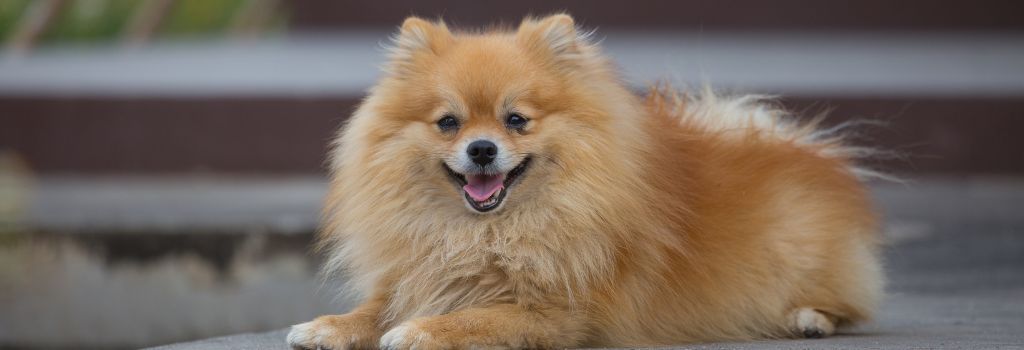If you're the proud parent of a Pomeranian, you're well aware that these tiny tots are jam-packed with personality and charm. These miniature fur-balls aren't just pets; they're heart-stealing entertainers in a fluffy coat. Let's dive into what makes the Pomeranian a perfect (though cheeky) canine companion.
Why Pomeranians Make Pawesome Friends
Choosing a Pomeranian probably means you were in the market for a pet with a big personality wrapped in a petite package. They're highly intelligent and playful, always up for a game of fetch or a puzzle toy. Their outgoing, friendly demeanor makes them a hit at social gatherings and their alert, curious nature ensures they're always in the middle of the action.
Highly trainable and eager to please, Poms are often easier to teach than some other breeds, which can make obedience classes a breeze. They're also incredibly protective, making them unexpectedly good watchdogs. Plus, these little bundles are sweet, gentle, and sensitive, offering endless cuddles and affection.

The Pom's Imperfections
Of course, every rose has its thorns, and our Pomeranians are no exception. Their intelligence and alertness can sometimes translate into excessive barking. They can also be possessive over their toys and meals, showing a dominant streak that needs to be managed.
Left alone too long, these intelligent canines can get bored and anxious, leading them to find their own type of 'entertainment'—usually the kind you won't appreciate! Housetraining can be a bit of a challenge, and due to their small size, they are more fragile and can be prone to injury. While they're generally friendly, Pomeranians can sometimes be snappy around children.
Worth It? Absolutely!
But oh, the joy of sharing your life with a Pomeranian! They’re lively and full of quirks, and with some early socialization and consistent training, they're an absolutely delightful addition to any household.
A Quick History Lesson
The Pomeranian has a fascinating history that begins in 16th-century Germany. Initially a much larger breed used for sheep herding, they were eventually miniaturized for companionship. Their popularity skyrocketed when Queen Victoria imported some to Britain in the late 19th century and even set up her own breeding program. While they bond quickly with their humans, Pomeranians aren't overly clingy and love to entertain with their comical tricks.
Generally speaking, Pomeranians are a healthy breed with an impressive lifespan averaging around 15 years. Treat them right, and you'll have a sassy, loving companion for a good long time. So cheers to life with a Pomeranian, a life that is guaranteed to never be dull!

Predispositions for Pomeranians
Heart Matters in Pomeranians: Listen to the Beat!
If you’re snuggling your little fluff ball right now, take a moment to think about their heart health. Pomeranians have a few vulnerabilities when it comes to heart disease, which can sneak up at any age. When your Pom is in for their regular check-ups (wink, wink, make sure they are!), your vet will be tuning into their heart with stethoscope ears. Sometimes they may go the extra mile with X-rays, ECGs, or even echocardiograms, especially if there are risk factors. Did you know? Dental care and weight management aren't just for looks; they're crucial for heart health too!
The Perils of Patent Ductus Arteriosis
There’s a tiny vessel that should close on its own shortly after birth, but in some Poms, it stays open. It’s called Patent Ductus Arteriosis, and it's a bit of a troublemaker. It makes the heart pump extra blood to the lungs, leading to fluid build-up and extra strain on your Pom’s heart. Your vet will listen for a specific type of heart murmur to catch this early. Mild symptoms might be hard to notice, but watch for fatigue, coughing, or weakness during playtime. Surgery can often resolve the issue, so early detection is key!
Heart Failure in Senior Poms
Old age can be golden but not without its challenges. Heart failure is sadly a leading cause of death for Pomeranians in their twilight years. Most often, this is due to a leaky heart valve that puts strain on the heart over time. If your Pom has a murmur or shows other signs like coughing or fatigue, a series of tests can determine the severity. Timely medication can prolong your pet’s life, often for many years. Again, don't skimp on dental care and do consider fatty acid supplements; they can work wonders for heart health.
The Quirky Sick Sinus Syndrome
Imagine your Pom's heart having its own little internal clock that ticks off the heartbeat. Well, sometimes the clock (also known as the sinus node) malfunctions, leading to a condition known as sick sinus syndrome. This means your Pom’s heart rate could be abnormally low, and you might even notice fainting spells, especially during exercise. The good news? Mild cases can often be managed with medication.

Navigating the Fog: Cataracts in Poms
Seeing your Pom's eyes cloud over can be alarming, but you're not powerless. Cataracts are a common issue in older Poms and can cause blindness if left untreated. Many Poms adapt well to reduced vision, but surgical options can also restore sight, so it’s worth discussing with your vet.
The Inward Roll: Dealing with Entropion
Your Pom's beautiful eyes could be at risk from entropion, a condition where the eyelid rolls inward and allows the eyelashes to scratch the eyeball. Ouch! Surgical correction can nip this in the bud if caught early, so make sure you're keeping an eye out for symptoms.
A Hairy Issue: Distichiasis in Pomeranians
Imagine having a rogue hair constantly poking your eye—sounds painful, right? This is what distichiasis does to your Pom. Extra hairs grow inside the eyelid and scrape against the cornea, causing discomfort, ulcers, and chronic pain. But fret not; treatments are available to permanently remove these hairs and make your Pom comfortable again.
Bone and Joint Quirks in Poms: From Skips to Hops!
Although they’re small, they sure are active, and sometimes their bodies can encounter some hiccups along the way. One such issue is patellar luxation, where the kneecap likes to play "peek-a-boo" and slip out of place. If you see your Pom running and then suddenly hopping or skipping, that's probably why. But worry not! Mild cases usually just need some arthritis medication, while severe cases might require surgery.
Spinal Adventures: When to Ring the Alarm
Spinal issues are unfortunately common in Pomeranians. Especially problematic are the first two neck vertebrae, which could lead to sudden spinal cord injuries. If you notice your little friend crying without reason or hesitating to jump or climb stairs, it’s time to act fast. Immediate medical attention is vital, and remember, maintaining an optimal weight can help prevent this. Pro-tip? Use ramps or steps for furniture, making life easier on that Pom neck!
IVDD: The Invisible Intruder
IVDD, or Intervertebral Disc Disease, can sneak up on Poms and lead to severe pain. The disease causes the cushion between vertebrae to rupture, pushing against the spinal cord. Symptoms can be sudden and drastic, so if you notice a change in your Pom's behavior or mobility, seek emergency medical help. Treatment may range from medication and rest to urgent surgery.
Bladder Stones: Not the Pebbles You’d Want
Some Poms might be prone to Hyperuricosuria, which essentially means too much uric acid in the urine. This can act as a catalyst for developing bladder stones. The good news? A DNA test can identify the risk early on, and a tailored diet can help in prevention. So, keep those annual vet appointments for urine tests and imaging!
GME: The Mysterious Foe
GME is a devastating condition affecting the central nervous system. It's more prevalent in small, middle-aged breeds like Poms, but the cause remains a mystery. Symptoms can vary, but treatment generally involves corticosteroids. Unfortunately, the prognosis is often poor, so prompt medical attention is crucial.
When It Rains Inside the Skull: Hydrocephalus
Imagine water pooling inside your dog’s skull—sounds alarming, right? Known as Hydrocephalus, water on the brain, this condition is common in dome-shaped heads like Pomeranians. Early diagnosis and appropriate treatment can manage symptoms effectively, so it's something we'll keep an eye on during check-ups.
The Unseen Cough: Tracheal Collapse
Poms might also face issues with their windpipe collapsing, leading to persistent coughing and breathing difficulty. Most cases are mild and manageable with medication, but severe cases might require surgical intervention.

Dental Drama: From Malocclusions to Braces!
Yes, even dogs can need braces! Poms are not exempt from dental issues, including misaligned teeth and abnormal bite. But with proper monitoring and sometimes orthodontics, these can usually be corrected. Isn't modern vet medicine amazing?
Skin Conditions: More Than Just a Bad Fur Day
From dry, scaly patches to hair loss, Poms can have their share of skin woes. Conditions like sebaceous adenitis require long-term treatment and often a combo of special shampoos and fatty acid supplements. Early diagnosis is key for effective management.
Fuzzy Coats and Bald Spots: Alopecia X
Alopecia X causes uneven hair loss and can give your Pom a rather patchy appearance. Neutering often resolves this issue, which is more cosmetic than health-threatening. Nonetheless, it's something to be aware of!
Thyroid Tales: The Hormonal Rollercoaster
Hypothyroidism is fairly common in Poms, manifesting as dry skin, hair loss, or even behavioral changes. Annual blood tests can keep track of thyroid health, and the condition is usually manageable with hormone replacement pills.
Don't have a vet in your area yet? We can help you find a local veterinarian.
If you have more questions, the GeniusVets Telehealth platform will give you unlimited access to text and/or video calls with board-certified veterinarians! To learn more click here.


